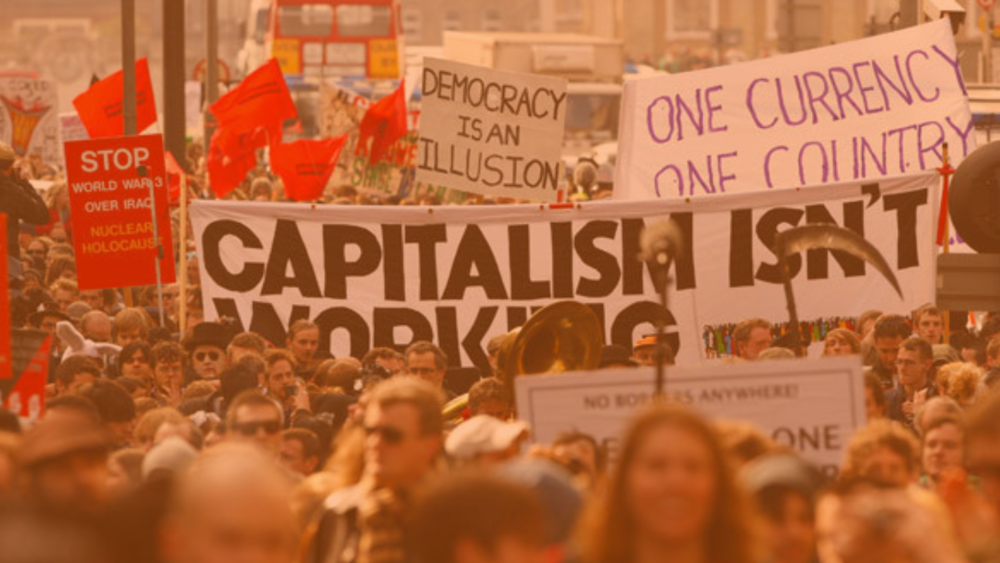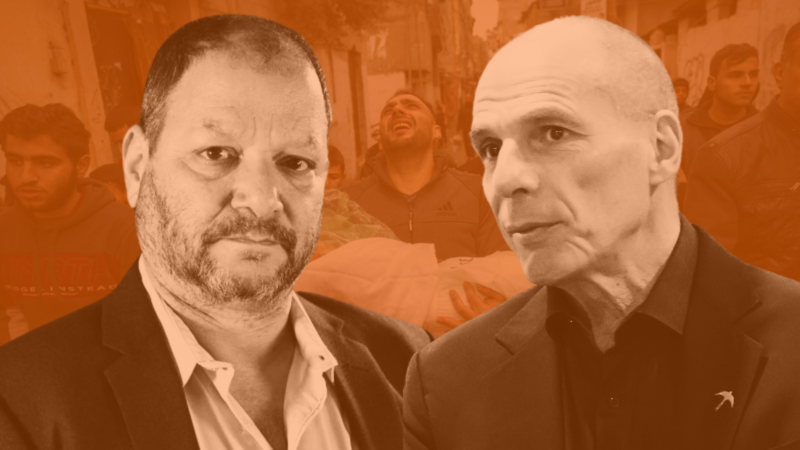Over all, the European elections have been devastating, though the picture is nuanced across the EU. What seems most striking is that the liberal governing parties of the two biggest economies, France and Germany, have suffered humiliating defeats to the benefit of the far right. That was to be expected, and we have to look at capitalism with its neoliberal reform policies as the root cause of the decline of our societies into authoritarianism.
In France, Rassemblement National scored a sweeping victory over president Emmanuel Macron’s Renaissance Party, and the German AfD came in second after the conservative CDU, relegating the government coalition of Social Democrats, Greens, and Liberals to the backseat. In Europe’s third biggest economy, Italy, the far-right government of Fratelli d’Italia was confirmed. So, economic power and political representation in Europe is now solidly dominated by the right, likely with the ruthless Ursula von der Leyen as Head of the Commission above the toothless parliament for a second term. Political differences aside, none of those parties mentioned above questions the neoliberal capitalist system; they have become two sides of the same medal.
Capitalism: A threat to democracy
We have been made to believe that democracy – or rather, liberal democracy – is by its nature the political system of choice of the capitalist, ‘free’ world, and therefore they go hand in hand. This is a sham. In the western part of the world, democracy worked best for the people as long as capitalism was reined in by state control over common goods and services. In the post-colonial states, political liberation was accompanied by the continuing grip of external capitalist power over people’s choices (while providing the resources for social safety nets in the former colonial states), and in most countries of the former Soviet bloc, the takeover of capitalism has right from the start created predatory oligarchies, the likes of which we now see emerging in the so-called West, too. China is the best example that there is no obvious link between the two systems. Now one can go and argue that the problem with all those non-Western states is their denial of liberal values, but much more coherently, it can simply mean that capitalism as such has nothing to do with freedom – or democracy.
Nowhere in capitalist societies has people’s participation ever been extended to economic power. Beyond representative democracy in the political sphere, control over capital remains shielded from democratic influence and ownership, be it in transnational corporations, global financial institutions, or the European Commission. Therefore, capitalism – and with it the neoliberal reform policies of the last decades – must be acknowledged as a threat to democracy as a political system for the many, not as its systemic ally. We should continue to conclude that, vice versa, the absence of capitalism does not automatically lead to authoritarian rule, or the end of economic entrepreneurship, as the ruling class fervently claims. Overcoming capitalism is our chance to achieve democracy as people’s self-determination, to combat racialised supremacy, and to prevent the climate meltdown.
Austerity as a means of control
Economic austerity targeting public infrastructure, social services and people’s income is a key policy tool of advanced capitalist regimes, which they first inflict on others and then on their own working classes. Political economists from different backgrounds have long suggested that austerity policies can have a detrimental effect on the democratic process and that growing precarity gives rise to extremist groups. That could be called a no-brainer. Looking at the current state of affairs in Europe, we can conclude that it is the right that thrives under social hardship and existential fears. And wherever progressive political visions threaten the system, they are crushed by exactly that: austerity measures, or the menace to impose them.
The next question is what is defined as extremist. In the political mainstream in Europe, the understanding of what is far left already starts with critiquing capitalism and its neoliberal policies, while to be labeled as extreme right, one has to be openly anti-democratic and racist, but certainly not anti-capitalist. While the current political centre has such a strong tilt to the right, it is still those who are even further out there on the spectrum, who are gaining ground. One step needs to be to recalibrate the political centre, and this can only mean to break the neoliberal consensus. With formerly leftist parties embracing austerity, the destruction of social infrastructure, and a war economy, this cannot be done. Under such circumstances, the decline into authoritarianism is predetermined as the means of control must get ever harsher.
Fearmongering, scapegoating, and endless war
Once people are consumed by existential worries, our rage must be channeled away from the actual source. It is virtually an in-built necessity of the capitalist system to distract us from the core issue, our continued exploitation. Therefore, there is no need for conspiracy theories of some puppet master behind the scenes as there is no need for an intermediary. The majority of capitalists may even be well-intentioned and still perpetuate the game.
The deeper the crisis, the more presumably ‘external’ threats will come up, feeding on human sentiments of fear when confronted with the unfamiliar, or other, and forging them into hatred. Depending on socialisation and current realities, the focus can be migrants, women, Muslims, Jews, queers, the disabled, homeless, or basically anyone. While in the past century, purges in capitalist societies were justified by the fight against communism, nowadays it is terrorism and cultural differences, always driven by latent or outright racism-antisemitism.
War is the final stage, and Europe is drifting towards it, not only as a profiteer but as a full party to it. This is not about denying Russia’s accountability for invading Ukraine, or other real threats; it is about preparing our societies for war as an inevitability.
Liberal authoritarianism: Setting the table for the fascists
The current situation with all its social disintegration and war rhetoric increasingly requires means of control that a peacetime democratic society does not have at its disposal. Taking Germany as an example, a respectful, pluralist public debate has long been replaced by a radical liberal consensus with no mercy for dissenting opinions. Gradually, mere exclusion from the public debate is giving way to smear campaigns and violent crackdowns on the freedoms of speech and association typical for states of emergency, or wartime.
The madness has gotten to a point where outrage against eight months of genocide in Palestine, enabled by our government and livestreamed to our smartphones, is considered a threat to the public order. If this is the reality now, under a coalition government of social democrats, greens, and liberals, the prospect of what may come next is truly disturbing.
Overcoming the neoliberal consensus
Any leftist or green movement should move to (re)claim the political spaces beyond the neoliberal consensus, which is currently leading us down an authoritarian path. While the political visions are manifold, an analysis of the present dangers inherent to the capitalist system can be a minimum common denominator to avert a dystopian future.
Fragmentation among the left is a well-known historical problem, and just like capitalism, it will not disappear tomorrow. However, looking at the outcome of the European elections, and the prospect of a second term of Ursula von der Leyen as President of the Commission, our opposition must be to the neoliberal consensus that has enabled this. No matter where our priorities lie, be it the fight for climate justice, against racism or homo- and transphobia, inspired by Marxist, feminist, intersectional, or decolonial thought, one thing is clear: the class struggle is not over.
MERA25, DiEM25’s electoral wing, was not able to gain a seat in the European Parliament. We are disappointed but also encouraged by our voters and growing membership. In the first two days after the elections alone, our membership in Germany increased by almost one third! We will continue our struggle, take stock to further develop our political program and strategies for an internationalist left, and seek alliances and common ground.
Do you want to be informed of DiEM25's actions? Sign up here















